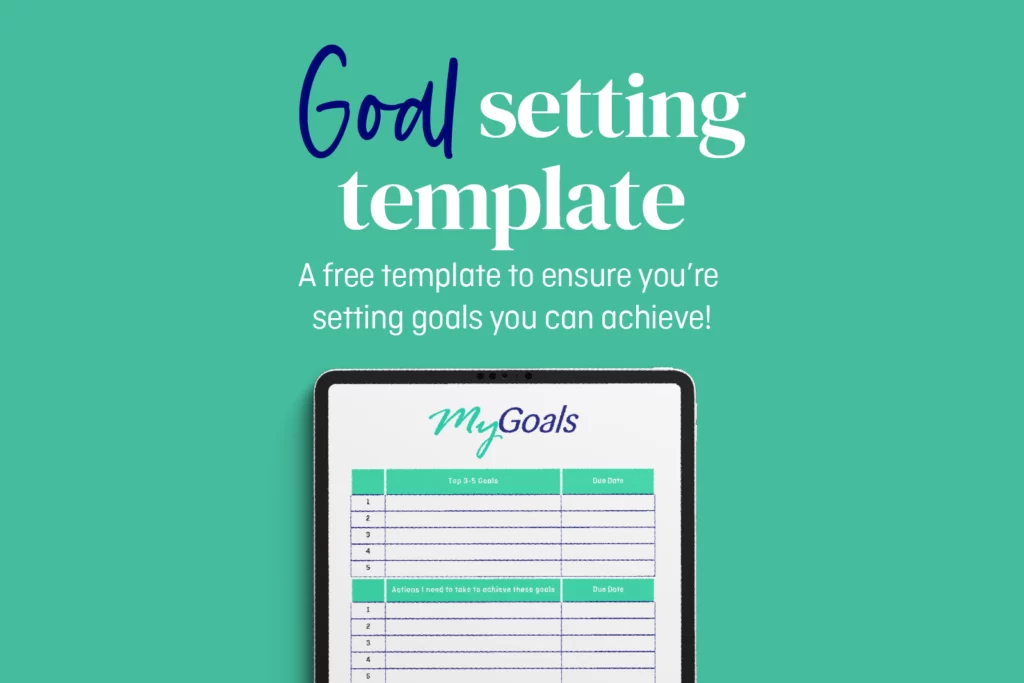How to set financial goals you’ll actually achieve: 5 easy steps
Got a list of financial goals that feels more like a wish list? You’re not alone. Saving for a house deposit, paying off debt, building emergency funds… it all adds up fast. But don’t worry; we’ve got a plan to help you turn those money dreams into reality.
Start with a FREE no obligation appointment
Feeling stuck with your financial goals? Here’s how to actually achieve them
Do your financial goals look more like a wish list? You’re not alone there. But, your goals don’t have to be hard, and it definitely doesn’t have to be all or nothing. In this guide, we’ll walk you through five practical steps to set financial goals you’ll actually achieve – a clear, straightforward guide that works. Whether you want to build an emergency fund, save for a car, or plan your wedding, these strategies will help you reach your financial goals faster.
Before we get started, download our free financial Goal Setting Template to get started

1. Start with your ‘why’ and find out what motivates you to achieve your financial goals
Why do you want to achieve your financial goals? If your answer is “because I should,” it might be time to dig a little deeper. Your goals need to mean something to you.
Think about the life you want to live. Are you dreaming of homeownership, becoming debt-free, or finally booking that dream holiday without maxing out your credit cards? Whatever it is, get specific about what you want to achieve and visualise your goals coming to life.
💭 Pro tip: manifest your success
Picture your goals clearly in your mind; the home, the holiday, the freedom from student loan debt. Feel it, believe in it, and give your goals the energy they deserve. The power of positive thinking can make a real difference when it comes to achieving your personal goals.
Here are some examples of being more specific with your goals:
- Instead of “I want to save money,” try “I want to save $20,000 for a house deposit in two years.”
- Instead of “I want to pay off debt,” try “I want to clear my $5,000 credit card debt by this time next year.”
When your goal has a purpose and a time frame, it’s easier to stay motivated and on-track.
2. How to break your financial goals into manageable steps
Big financial goals can feel overwhelming, but breaking them into smaller tasks makes them manageable. Focus on one step at a time, and you’ll see progress faster, and be motivated to keep going.
Break it down to make it achievable
Say your goal is to save $10,000 for a new car. Instead of focusing on the whole amount, break it down:
- $10,000 over two years = $417 per month = about $14 a day.
Suddenly, that big goal feels way more achievable, right? Progress is progress, no matter how small.
The key is to start with a realistic goal and break it down into smaller steps. And remember, breaking down your list of goals into short-term objectives and longer-term goals will help you stay on track. You don’t have to do it all at once; effective goal setting is about taking one step at a time.
💡 Pro tip: track your progress
Use free tools like MyBudget’s Personal Budget Template, to track your progress and adjust your plans as needed.
3. How to prioritise your financial goals to stay focused
Here’s a hard truth: You can’t do everything at once. Trying to save for a house, pay off credit card debt, build your emergency fund, and buy a new car all at the same time? You’ll likely end up doing none of them well.
Focus on your most pressing priority
Instead, prioritise your financial goals by focusing on your most pressing financial priority. What’s the one financial goal that’s keeping you up at night? Start there.
For some people, it’s paying off high-interest credit cards or building an emergency fund to cover unexpected expenses. For others, it’s saving for a comfortable retirement or tackling student loan debt. Whatever it is, knock that one goal out first before moving on to the next.
Create a list of priorities
- Identify your most pressing financial priority
- Align your short-term goals with your long-term financial goals
- Track your progress regularly
4. Why automating your financial goals can help you achieve them faster
Automation is your best friend when it comes to achieving financial goals. Why rely on willpower when you can put your savings on autopilot? It’s all about setting things up once and letting your money do the work for you.
Here’s how to make it happen:
Open a dedicated savings account: keep it separate from your everyday spending to avoid temptation.
Set up automatic transfers: schedule a set amount to transfer each week or month. Pick a time frame that suits your cash flow.
Let your savings grow: out of sight, out of mind means you’re less likely to dip into it for non-essentials.
And if you’re a MyBudget client, we take care of the calculations and set up automated transfers for you. Imagine the peace of mind knowing your money is working behind the scenes, even when you’re busy enjoying a holiday or bingeing your favourite Netflix series.

5. Common mistakes people make when setting financial goals (and how to avoid them)
We’re all human, and we all make mistakes. But when it comes to financial goals, a little awareness can save you a lot of time (and money). Here are some things to remember:
🚩 Mistake #1: Setting unrealistic financial goals
Want to pay off a large debt in six months? Unless you’re about to win the lotto, it’s probably not happening. Be realistic. Set goals that challenge you, but are still achievable.
🚩 Mistake #2: Not tracking your financial progress
If you’re not tracking your progress, how will you know when you’ve hit a milestone? Keep your eyes on the prize and celebrate your wins along the way.
🚩 Mistake #3: Trying to achieve your financial goals alone
Sometimes, just the thought of getting on top of your finances can be overwhelming. But you don’t have to go it alone. MyBudget has helped over 130,000 Australians take control of their finances and achieve their biggest goals. Whether it’s paying off debt, building savings, or setting up long-term financial plans, we’re here to help with expert help and guidance.
Ready to achieve your financial goals? Let’s make it happen
At MyBudget, we believe that everyone deserves to live a life free from money worries. We’ll do the heavy lifting for you, managing your budget, paying your bills on time, and building your savings so you can focus on the things that matter most.
Here’s how MyBudget will help you achieve your financial goals:
✅ 12-month budget plan Personalised to your goals
✅ We do the work Bills, savings, payments managed
✅ See your money grow Track it all with the MyBudget app.
Why wait to start living the life you want? Enquire online today or give us a call on 1300 300 922 to start your journey toward financial freedom.
Start with a FREE no obligation appointment
